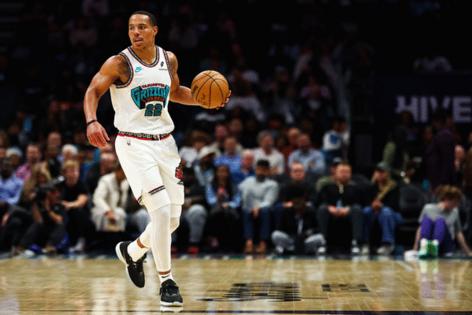What Magic's trade for Desmond Bane could mean for Celtics
Published in Basketball
BOSTON — Six weeks after being bounced by Boston in the opening round of the playoffs, the Orlando Magic pulled off the first major move of the NBA offseason.
The Magic gave up a haul Sunday to add Grizzlies guard Desmond Bane to their young and talented core. In return for the 26-year-old, Memphis received four first-round draft picks, a future pick swap and veterans Kentavious Caldwell-Pope and Cole Anthony.
The blockbuster trade should help Orlando take another step toward true contention in a wide-open Eastern Conference. And the price it paid to land Bane, who’s entering Year 2 of a five-year, $197.2 million contract, hints at potential compensation for the Celtics’ core stars if Boston chooses to make them available this offseason.
Here’s a closer look at the deal from a Celtics perspective:
Magic loading up
Bane — who was technically drafted by the Celtics in 2020 but traded to Memphis on draft night — fills the Magic’s two most obvious needs: scoring and perimeter shooting.
Orlando ranked 27th in offensive rating and 28th in points per game this season while shooting a league-worst 31.7% from 3-point range. Bane averaged 20.2 points per game over his four seasons as a Grizzlies starter and is a career 41.0% 3-point shooter. He’s a solid defender, too, and should fit in well alongside Paolo Banchero, Franz Wagner and Jalen Suggs, the latter of whom missed the playoffs after undergoing knee surgery.
Banchero, Wagner and Suggs all will be 24 or younger when next season tips off.
Bane is a clear upgrade over the 32-year-old Caldwell-Pope, who underperformed his three-year, $66 million contract in his lone season in Orlando. Caldwell-Pope and Anthony, a rotation guard, combined for just 36 total points in the five-game series against the Celtics, going 6-for-29 from three. Orlando as a team scored 100 points or fewer in all five games.
The hyper-physical Magic already were a pain to play against. If they can replicate their stifling defense (second-best rating this season behind Oklahoma City) while adding much-needed balance to their offense behind top stars Banchero and Wagner, they’d quickly become one of the teams to beat in the East.
You could argue they now have a stronger chance of contending in 2025-26 than the Celtics do, though Boston’s ceiling will be difficult to project until we know more about Jayson Tatum’s recovery timeline and how president of basketball operations Brad Stevens intends to retool the C’s roster this offseason.
Celtics trade outlook
Don’t expect a Bane-esque return for any of Boston’s most likely trade candidates (Jrue Holiday, Kristaps Porzingis and Sam Hauser), who aren’t comparable assets based on their age, injury history, contract status and/or role. No team is trading multiple first-round picks for 34-year-old Holiday and the $104 million remaining on his deal, even if the veteran guard still could be a valuable contributor for a contending club.
But if the Celtics were to make Jaylen Brown or Derrick White available? Then they might be able to fetch a trade package in this neighborhood.
The 28-year-old Brown was an All-Star in four of the last five seasons and has an NBA Finals MVP on his resume. He’s coming off arthroscopic knee surgery but is expected to be fully cleared in time for training camp, according to the Celtics.
White is older (31 next month) but has a blend of defense, outside shooting, basketball IQ and unselfishness that any team would desire. Both are signed for at least three more seasons, though Brown’s salary is quite a bit higher than White’s ($53.1 million next season compared to $28.1 million).
Bane was the second in-his-prime, team-controlled, zero-time All-Star to be traded for a bundle of first-round picks in the last 12 months. Last July, the New York Knicks gave up five future firsts and more to acquire then-27-year-old wing Mikal Bridges.
Would the Celtics even entertain a trade involving Brown or White? That’s arguably the biggest question facing the franchise this offseason. Dealing either (and especially Brown) would mean prioritizing asset acquisition and future financial flexibility over remaining competitive while Tatum works his way back from Achilles surgery.
If the Celtics hope to dip beneath the second apron of the NBA’s luxury tax and avoid the accompanying penalties, they’ll need to trim roughly $20 million in salary from a roster that’s on track to be the most expensive in league history next season.
©2025 The Boston Herald. Visit at bostonherald.com. Distributed by Tribune Content Agency, LLC.







Comments